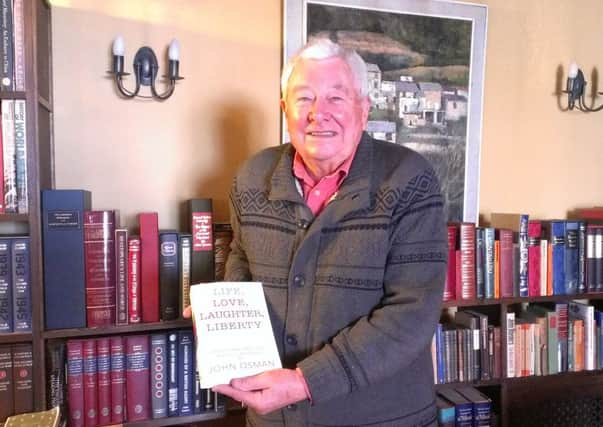Writer tells life story after obituary error


The 85-year-old was a little surprised to hear the premature news in 2012 but it inspired him to write his ‘reflections on a long and full existence’, called Life, Love, Laughter, Liberty.
Mr Osman started his career as a junior reporter on the Evening Argus and when his apprenticeship ended five years later, he was tempted over to the Worthing Herald by the offer an extra £1 a week in wages.
Advertisement
Hide AdAdvertisement
Hide AdHe became the sports editor at the Herald but covered news stories, too, before leaving to work in Bristol in 1951. He went on to work for the Press Association, Daily Telegraph and BBC.
“Reporting essentially doesn’t change its nature, no matter what you are covering,” pointed out Mr Osman.
Born in Durrington, he went to Worthing High School before becoming a reporter. His father’s favourite pub, the John Selden, in Salvington Road, Worthing, gave him his first big scoop.
“The pub put up a new sign, the Sir John Selden,” he recalled. “I spotted it and thought he couldn’t have been a ‘Sir’ when he was against the King, Charles I.
Advertisement
Hide AdAdvertisement
Hide Ad“The brewers admitted their mistake and ordered a new sign. I was 21 years old and the landlord was so pleased with the publicity, I more or less had beer on the house for a few weeks. It was my first real scoop.”
Years later, he found it rather touching to see the Herald put in a piece with the headline ‘Our man in Moscow digs out facts’, recording his work for the BBC in 1982, covering the death of Soviet statesman Leonid Brezhnev.
Mr Osman said the Russians were not very open about the situation, so at first he was reporting that Brezhnev ‘might be dead’, and it turned out that he was.
One of the biggest assignments in his long career was the Dalai Lama fleeing to India from Tibet in 1959. He even still has the rug that he bought in Sikkim at the time.
Advertisement
Hide AdAdvertisement
Hide AdBut the assignment he is most proud of was one that played a part in the outlawing of slavery in Saudi Arabia.
Working for the Sunday Telegraph, he carried out an investigation into slavery, starting in Timbuktoo and working his way across Africa to Saudi Arabia.
Mr Osman said: “I discovered in the Mali Embassy hundreds of slaves hiding out. I photographed them and recorded all their stories then presented the evidence.
“One of King Faisal’s first acts in the early 1960s was to outlaw slavery and I like to think that I did my little bit towards that. My images were later used by anti-slavery campaigners for their Christmas card.”
Advertisement
Hide AdAdvertisement
Hide AdThe nature of his work means the book is very serious in parts but there is a good deal of humour, too.
“It is a lively story of my life,” said Mr Osman. “There is also a good deal of local reminiscence in the book.”
He married the journalist Virginia Waite, 46 years ago. She also worked on the Telegraph and was one of the first female travel writers.
After Mr Osman retired in 1987, the couple travelled the world, camping in a Romahome and enjoying skiing and sailing in various locations.
They returned to Sussex to settle in High Street, Steyning, where they have lived since 1990.